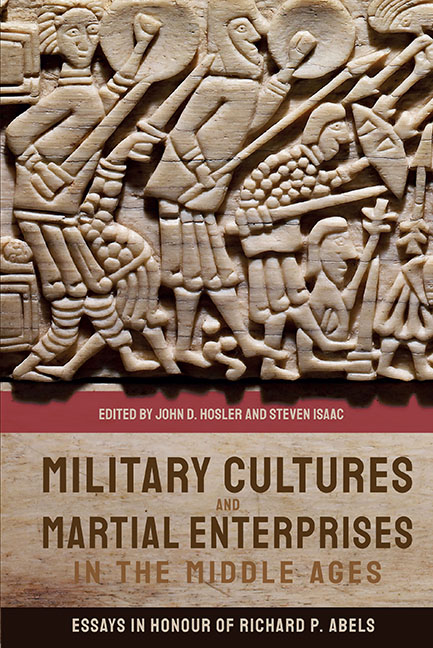Book contents
- Frontmatter
- Contents
- List of Illustrations
- Notes on Contributors
- Introduction and Appreciation
- 1 Charlemagne’s Invasion of Spain in 778: The Anatomy of a Strategic Failure and its Impact
- 2 Military Intelligence and Strategic Planning Under the Ottonian Kings of Germany, 919–1024
- 3 Ain’t Nobody Here But Us Chickens: Defeated Warriors, Masculinity, and Mistaken Identity in Western Europe, 679–1141
- 4 Count Baldwin V of Flanders: Broker of Eleventh-Century Power
- 5 Kings and Fortuna: The Meanings of Brémule
- 6 Fighting the Last War: Remembering the Norman Conquest during the Anarchy
- 7 Gilbert of Mons’ Chronicle of Hainaut as a Source for Military History in the Twelfth Century
- 8 At Home with Roger of Howden
- 9 Embedded Reporters? Ambroise, Richard de Templo, and Roger of Howden on the Third Crusade
- 10 The Treatment of Male and Female Prisoners of War during the Third Crusade
- 11 Exempla, Crusade, and Chivalry
- 12 Frontier Warfare in the St Omer Chronicle
- 13 Some Observations on the Training of Medieval Warhorses
- Richard P. Abels’ Curriculum Vitae
- Index
- Tabula Gratulatoria
3 - Ain’t Nobody Here But Us Chickens: Defeated Warriors, Masculinity, and Mistaken Identity in Western Europe, 679–1141
Published online by Cambridge University Press: 21 October 2020
- Frontmatter
- Contents
- List of Illustrations
- Notes on Contributors
- Introduction and Appreciation
- 1 Charlemagne’s Invasion of Spain in 778: The Anatomy of a Strategic Failure and its Impact
- 2 Military Intelligence and Strategic Planning Under the Ottonian Kings of Germany, 919–1024
- 3 Ain’t Nobody Here But Us Chickens: Defeated Warriors, Masculinity, and Mistaken Identity in Western Europe, 679–1141
- 4 Count Baldwin V of Flanders: Broker of Eleventh-Century Power
- 5 Kings and Fortuna: The Meanings of Brémule
- 6 Fighting the Last War: Remembering the Norman Conquest during the Anarchy
- 7 Gilbert of Mons’ Chronicle of Hainaut as a Source for Military History in the Twelfth Century
- 8 At Home with Roger of Howden
- 9 Embedded Reporters? Ambroise, Richard de Templo, and Roger of Howden on the Third Crusade
- 10 The Treatment of Male and Female Prisoners of War during the Third Crusade
- 11 Exempla, Crusade, and Chivalry
- 12 Frontier Warfare in the St Omer Chronicle
- 13 Some Observations on the Training of Medieval Warhorses
- Richard P. Abels’ Curriculum Vitae
- Index
- Tabula Gratulatoria
Summary
RICHARD ABELS HAS an enviable knack of looking at medieval warfare from less frequently considered angles. While his work on Anglo-Saxon logistics and peace-making have helped to determine the shape of the study of the reign of Alfred the Great (and I owe Richard a debt of gratitude for these contributions), this chapter is offered in the spirit of Richard's valuable work on warrior cowardice, a topic which still remains too little considered in the study of warfare. This chapter is about the emasculation and humiliation of warriors often on the move – away from the enemy – whose identities are subverted by disguise or by error. Using a range of examples from early and central medieval narrative histories, from Bede in the eighth century to Orderic Vitalis in the twelfth, the following discussion addresses the position and perception of warriors in medieval society across a period of nearly half a millennium in which the expectations of behavior and conduct of the warrior changed but the expectations of masculine military identity remained somewhat constant.
Mistaken identity itself is a staple of medieval literature and folk literature more generally, of course. In the European Middle Ages, authors and storytellers frequently reached for the ways in which identity – normally presented as something fixed and immutable – might be subverted for the purposes of narrative. While the motif of disguised and mistaken identity is familiar in medieval literary sources, I wish to focus here less on the notion of the warrior in disguise for a particular ruse but rather on subversion of the identity of warriors who are defeated and/or on the run. This approach allows exploration of the subversion of masculine expectations of warrior behavior. By way of an example relevant to Abels’ Alfredian interests, two motifs of mistaken identity which link the Anglo-Saxon and post-Conquest periods might usefully be drawn upon to establish the premise of the discussion (albeit as the only point when Alfred the Great is discussed in this chapter): the flavor of the following discussion owes less to William of Malmesbury's vignette of King Alfred cunningly disguised as a minstrel in the enemy camp on the eve of battle – the classic disguise narrative of the twelfth century as it encompasses Alfred's alleged gathering of intelligence – than to the Annals of St Neot's earlier portrait of Alfred mistaken as a poor peasant.
- Type
- Chapter
- Information
- Military Cultures and Martial Enterprises in the Middle AgesEssays in Honour of Richard P. Abels, pp. 61 - 80Publisher: Boydell & BrewerPrint publication year: 2020



